Grupo ATC’s vehicle logistics division TLE Automotive has doubled its transporter fleet and is one of Mexico’s biggest vehicle haulaway firms. Now it is looking to build on quality, safety and innovation to meet the challenges on the road ahead
Grupo ATC is one of Mexico’s biggest providers of freight road haulage and its TLE Automotive (TLEA) business unit is focused on transport and yard management services for finished vehicles.

With a fleet of 300 car haulers, TLEA serves 17 major vehicle makers in Mexico with operations across the country, including the top three (see boxout). The company has invested to expand operations and double its fleet of transporters in the last year. As a result, TLEA is projected to move almost 201,000 vehicles this year, up from the 160,000 moved in 2023.
Other companies within Grupo ATC also handle vehicles. Sister company TLE works with Stellantis to move commercial fleet vehicles on flatbed trucks, of which the division has around 250. PHES Transportes, dedicated to federal freight, has a further 50 vehicle transporters. In total, Grupo ATC has around 600 transporters able to carry finished vehicles in Mexico.
The increase in volumes at TLEA reflects the production growth in Mexico and the high volumes of vehicles being moved across the domestic dealer network, or for export to the rest of North America and overseas. Total vehicle production in Mexico in 2023 was around 3.8m and the top three carmakers by volume in Mexico – GM, Nissan and Volkswagen – export 80% of their domestic production. Last year their combined production was just under 1.7m (see boxout), meaning that 1.35m vehicles were moved to the ports of export or north of the border to the US and Canada.
Top three vehicle makers in Mexico in 2023
| Carmaker | Output |
|---|---|
|
GM |
722,631 |
|
Nissan |
615,751 |
|
Volkswagen |
349,200 |
|
Total |
1,687,582 |
China volume influx
The increase in vehicle volumes is also a result of the significant increase in Chinese vehicle imports to Mexico. MG, which is owned by SAIC, is one of TLEA’s customers. In the first six months of 2024 MG sold more than 24,500 vehicles in Mexico, a 6.4% increase on the previous year according to figures from the Association of Mexican Automotive Distributors (AMDA). Over the same period, sales of other Chinese carmakers under the Motornation brands, which include BAIC, Changan, DFSK, JMC and Seres, amounted to 5,200 (+22.1%). Sales of Chery brand vehicles (which include Chirney, Jaecoo and Omoda) amounted to just over 14,000 (-24.8%) between January and June. And Great Wall Motors entered the Mexican market, with just more than 6,500 vehicles delivered in the first six months of the year. Altogether, Chinese vehicle makers sold almost 50,400 vehicles in Mexico in H1 of 2024.
A spokesperson for TLEA confirmed there are currently a lot of car dealers in Mexico selling Chinese brands and increasing their sales. Mexico had become a strategic entry point for Chinese brands to the wider North American market.
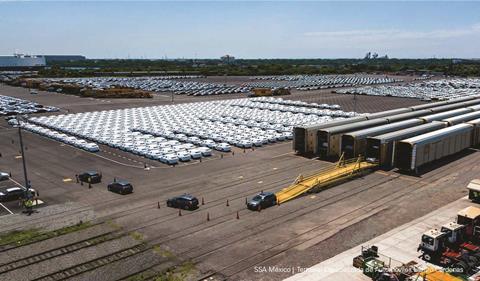
Port pressures
The combination of greater production for export and greater import volumes has put considerable pressure on the vehicle-handling ports. Veracruz, Lázaro Cárdenas, Altamira and Mazatlán all saw volume increases in in 2023 (read our data snapshot of performance at the vehicle-handling ports in Mexico).
“Last year there was a lot of saturation, with more than 20,000 vehicles stopped at the ports,” says TLEA’s spokesperson. “That put a lot of demand on the established carriers. “Mexico also had some issues with rail, which put more demand on road transport.”
Problems on the rail freight network in 2023 included Ferromex having to halt 60 trains heading north to the US border because of the number of migrants attempting to ride freight trains and the fatal accidents that resulted.
Unfortunately, that came at a time when there was a deficit of car haul capacity in Mexico. Since then, however, the situation has improved, according to TLEA. Like TLEA, transport companies have invested in fleets and rail services have stabilised.
“Nowadays, we can say that the availability of trucks on the market is meeting demand and it is going to be all about competition this year, as it was many years ago,” says TLEA’s spokesperson.
Terminal operators and logistics providers have been resorting to overflow vehicle yards around the ports, including at Veracruz, Lázaro Cárdenas and Mazatlán. Those yards help extend loading times and remedy congestion.
TLEA is also now turning its attention to the storage of vehicles for customers in external yards and by the end of 2024 intends to have yards in place to complement its other finished vehicle services and avoid congestion that has been associated with the railheads and ports.
Grupo ATC business units
TLE
53-foot dry boxes, 40-foot and 53-foot truck platforms, and curtained trailers, for mixed cargo
TLE Automotive
Dedicated finished vehicle transport services
PHES Transportes
Specialists the transport of containers or steel coils and bars, car haulage (FVdry boxes, transport of material and general cargo
D-Troy Logistics collaboration
53-foot dry boxes and dedicated finished vehicle door-to-door transport services between the US and Mexico
Security strategy
Another factor affecting port operations is that last year the government deployed marine troops to take operational charge of the port terminals, in part to increase security and control drug trafficking. Cargo throughput, including for vehicles, has since been subject to strict checks, which has increased the waiting time and that leaves companies such as TLEA looking for other areas to recover productivity.
Security is also needed for the inland transport of vehicles. Theft and damage have long been a problem for the automotive industry in Mexico. The government has set up military-backed convoy operations on routes that are subject to attack.
“Transport companies have to reinforce their security protocols and look for new parties to be able to transit dangerous highways to reduce or eliminate stealing and damage to vehicles,” explains TLEA’s spokesperson.
TLEA has also taken its own protective measures, using advanced technology and developing a stronger training programme for its drivers, as well as its operational and administrative personnel. “We have been working on that issue because it’s a reality we face in Mexico,” says the spokesperson.
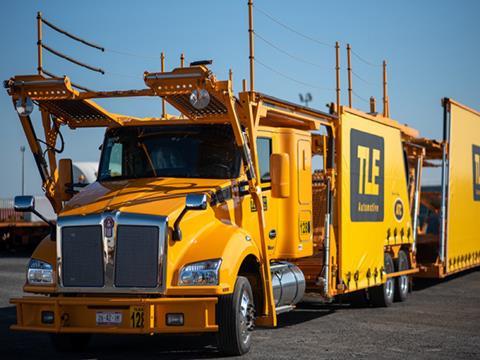
Capitalising on capacity
As well as investing in doubling its fleet of transporters, TLEA has been working on strategies to make the most of the capacity it has across the different divisions of Grupo ATC. One of the group’s alliance partners is D-Troy Logistics, which operates in the US out of Dallas and TLEA is adopting D-Troy’s best operational practices for maximising its trucks’ productivity considering truck drivers are only allowed to drive for 11 hours after having 10 hours off duty to rest.
Having the alliance with D-Troy also helps with cross border shipments to the US. TLEA has a secure hub in Monterrey that it can use to export or import finished vehicles, car components or spare parts to or from the US. D-Troy trucks dispatch from the Monterrey hub directly across the border and because it is a US company the trucks are certified, speeding up the cross-border transit time to 15 minutes.
Vehicle makers are also extending their operational schedules, and plants and ports are extending operating times to increase productivity and vehicle throughput. Previously, loading vehicles at the assembly plants in Mexico was only carried out in daylight. Now, however, carmakers have invested in artificial flood lighting to extend the hours of loading.
“It’s very helpful because we do not have only export operations to load at ports, we also have imports and national operations to deliver to the car dealers,” says TLEA’s spokesperson. That includes in high density cities, where access for load car haulers is difficult because of traffic unless it is overnight (with some exceptions). “With the extension of the operational hours at the plants it gives us more productivity across our clients.”
Quality services
Looking ahead, and following its sizeable investment over the last year, TLEA is now focused on quality in services, and making the outbound supply chain stable and efficient for its customers. “We’re going to work really hard on perfection and excellence,” says the spokesperson.
As mentioned above, TLEA is expanding its external storage yard operations going into 2025 and looking further ahead will start to offer pre-delivery inspection and accessorisation services for its customers at these locations.
TLEA says that its wide customer base was the result of offering higher standards across the whole group. “TLE is a company that is focused on special attention, innovation and communication, and it has high standards on quality and safety,” he says. “All the activities we perform on daily basis are focused on giving our clients the best service. We believe that we are here to make the supply chain easier for all of our customers.”
High demand led to TLEA increasing its fleet and now it is focusing on adding services, which the company believes is good news for its people, with new jobs created, and new challenges and opportunities ahead.

























![Global[1]](https://d3n5uof8vony13.cloudfront.net/Pictures/web/a/d/s/global1_726550.svgz)


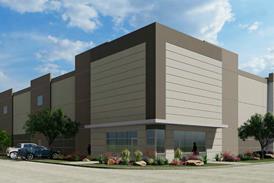


![Mexico[1]](https://d3n5uof8vony13.cloudfront.net/Pictures/web/a/d/s/mexico1_22990.svgz)
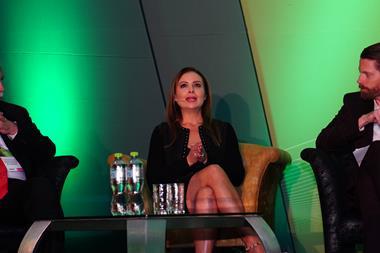


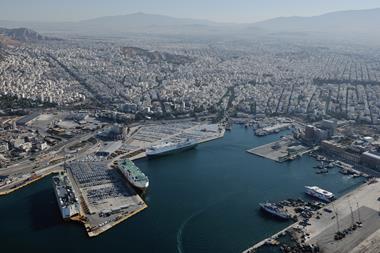





No comments yet